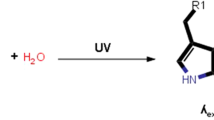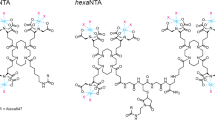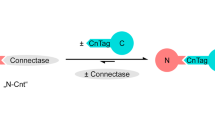Abstract
BY coupling enzymes to the reduction of a tetrazolium salt, dehydrogenases can be located on electrophoresis strips, and several have been shown to consist of more than one protein component1,2. It is possible to detect other enzymes if their action leads to the formation of a compound which can be oxidized by a suitable enzyme in the incubation mixture. In this way triosephosphate isomerase (TPI) has been located by coupling it with phosphoglyceraldehyde dehydrogenase.
This is a preview of subscription content, access via your institution
Access options
Subscribe to this journal
Receive 51 print issues and online access
$199.00 per year
only $3.90 per issue
Buy this article
- Purchase on Springer Link
- Instant access to full article PDF
Prices may be subject to local taxes which are calculated during checkout
Similar content being viewed by others
References
Fine, I. H., Kaplan, N. O., and Kuftinec, D., Biochem., 2, 116 (1963).
Thorne, C. J. R., Grossman, L. I., and Kaplan, N. O., Biochim. Biophys. Acta, 73, 193 (1963).
Scopes, R. K., Biochem. J. (in the press).
Author information
Authors and Affiliations
Rights and permissions
About this article
Cite this article
SCOPES, R. Detection of Triosephosphate Isomerase after Electrophoresis. Nature 201, 924–925 (1964). https://doi.org/10.1038/201924b0
Issue Date:
DOI: https://doi.org/10.1038/201924b0
Comments
By submitting a comment you agree to abide by our Terms and Community Guidelines. If you find something abusive or that does not comply with our terms or guidelines please flag it as inappropriate.



